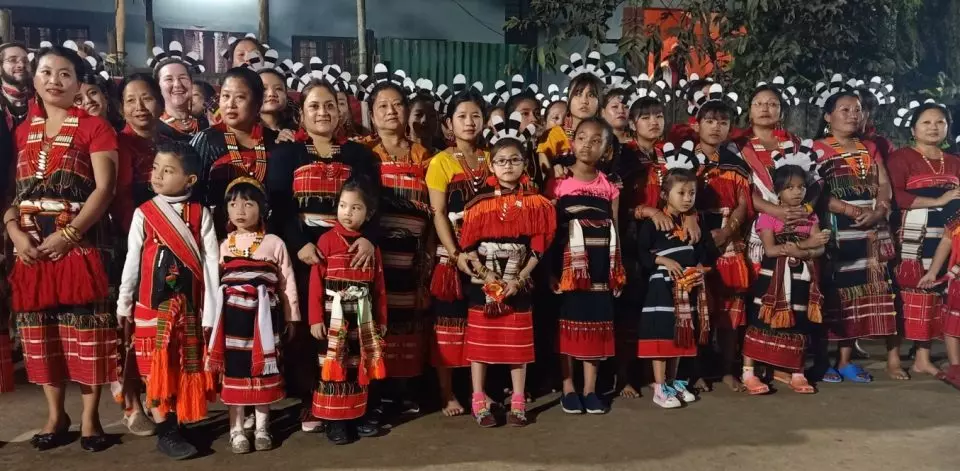
With 198 women in fray, Nagaland scripts history in civic polls
Nagaland to hold civic polls after 20 years and and multiple litigations, with 33% reservation for women

Nagaland is holding elections to the urban local bodies (ULB) for the first time today (June 26) with a quota for women, a move that is expected to change the state's male-monopolised political landscape.
Three municipal councils — Dimapur, Kohima, and Mokokchung — and 36 town councils will go to the polls after 20 years and multiple litigations. The stalemate was primarily caused by the powerful tribal bodies’ objections to the constitutionally mandated 33 percent reservation for women.
The resistance had turned violent in 2017 when the Nagaland government tried to conduct polls with reservation for women as mandated by the 74th amendment to the Constitution. Two persons died and several others injured in the violence that broke out on the eve of the polling day. The protestors set ablaze government offices, including the Kohima Municipal Council building. Weeks of unabated violence forced then Chief Minister T R Zeliang to resign.
Mood upbeat now
This time around the mood a day before election is of expectations and hope, particularly among womenfolk.
“The women reservation in civic bodies will be a great leap forward towards political empowerment of Naga women. I am very excited about the prospect…..If elected, I will not only work for the uplift of my locality but will also be the voice of women of my area,” said Apale Thopi, the Congress candidate from Dimapur Ward No 4.
She is among the 523 candidates in the fray, of whom 198 are women. Initially, 670, including 238 women, had filed nominations. Of them, 79 candidates pulled out of the race, 64 won uncontested, and four nominations were rejected.
It's a new record
Never before have so many women contestants tried their electoral fortune in an election to the state’s political decision-making body. Their representation remained so poor that the number of women candidates never exceeded five in assembly elections.
This is primarily because Naga customary practices and laws exclude women from positions of power. In traditional bodies such as village councils, women are not given representation, though they otherwise play a pivotal role in family and community affairs, even mediating inter-village wars and disputes.
The tribal bodies were of the view that the women's reservation would infringe on Naga customary practices and the special provisions granted to the state under Article 371A of the Constitution to protect Naga culture, customs, social and religious practices, and land ownership.
The state government was caught in a bind when Naga women bodies moved the Supreme Court seeking 33 per cent reservation for females in ULBs. The apex court in 2022 directed the state government to hold the elections as per the constitutional provision.
Meetings galore to break deadlock
The government held a series of consultative meetings with the tribal organisations to break the deadlock. A compromise was agreed upon after the state government amended the Nagaland Municipal Act in 2023, removing the provision for reservation of the chairperson post and paving the way for the elections. Significantly, Nagaland elected two women to the legislative assembly for the first time only last year. The state got its first woman Rajya Sabha MP, Bharatiya Janata Party (BJP) nominee Phangnon Konyak, in 2022.
“We finally agreed to the reservation because after thorough discussions, the stakeholders felt that our customary practices will not be hampered since the state government has agreed not to reserve the top post of chairperson,” said a senior Naga tribal leader, Imtipokyim. He was until recently a senior member of the Naga Hoho, an umbrella body of Naga tribes, and the general secretary of the Ao Senden, the apex tribal body of the Ao Naga community.
The current Naga Hoho chief Sulanthang Lotha, who took charge recently, did not wish to comment on the issue.
“The reservation for women in urban local bodies is expected to increase political participation among women, greater attention to issues affecting women and communities, and the emergence of women leaders who can influence policy-making, enhancing the overall quality of governance. Increased participation of women in leadership roles can inspire future generations, promoting a more egalitarian society,” said Bomito V Kinimi, a Naga student at MIT- School of Government.
A new beginning
"The inclusion of women in legislative bodies by itself will not politically empower them," said Monalisa Changkija, editor of an English daily and the state’s most powerful woman voice.
“Historically, women in decision-making bodies in India in general did not do much for women empowerment. The two newly elected female MLAs and the lone Rajya Sabha MP have so far failed to carve a niche for themselves. They are just toeing the lines set by the male leaders of their respective party,” she added.
She, however, was quick to add that at least a new beginning has been made to make the Naga society more gender inclusive.
The next step should be to reform the customary laws to make them more inclusive, she added.

